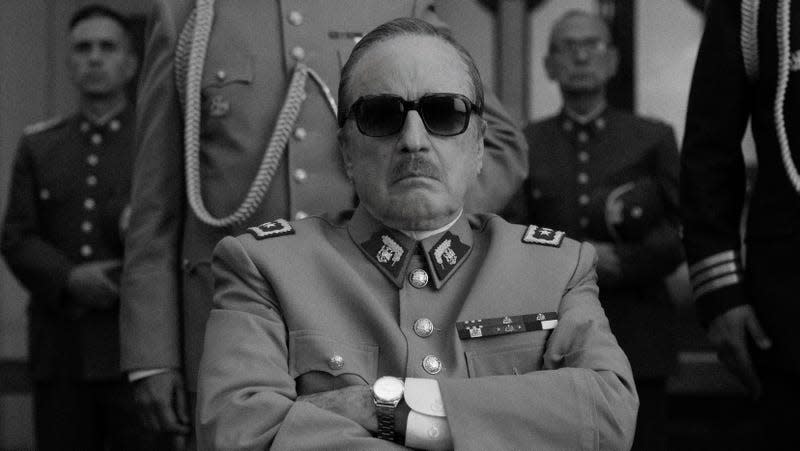El Conde review: Dictators suck in Pablo Larraín's vampiric satire

- Oops!Something went wrong.Please try again later.
- Oops!Something went wrong.Please try again later.
Jaime Vadell in El Conde
Somewhere along the line, vampires got sexy. But the original myth places its emphasis far more on the blood than the sucking. In early European folklore, vampires were bloated and decidedly gross. By the turn of the 20th century, starting in earnest with Bram Stoker’s 1897 novel Dracula, they were being talked about in a political context as blood-sucking creatures moving from host to host, killing in order to maintain their own tenuous grasp on life. This is the kind of vampire that Augusto Pinochet, the dictator who ruled Chile for 17 years, is—at least in Pablo Larraín’s new satire El Conde (in English, The Count).
Larraín’s version of Pinochet (Jaime Vadell) is having a hard time adjusting to his life on society’s outskirts, living in a Gothic manse somewhere in Patagonia. Once you’ve acquired a taste for the best, we’re told, it’s hard to go back to what you knew before. We see this with the dictator’s attitude toward his aging body and dwindling wealth, and his difficulty in giving up his brutal method of consumption: eating a still-warm heart, freshly cut out of the victim’s body. But Pinochet doesn’t even seem to have the energy or interest to tell his own story; while the scenes with dialogue between him and his posse are delivered in Spanish, the film is narrated in British English. We are hearing this story from a fellow outsider.
Read more
MGM Grand Cyberattack Allegedly Caused by 10-Minute Phone Call
Blink-182's Tom DeLonge Made a Sci-Fi Film and It Looks Delightful
LeBron James, wife and 2 associates named in federal PED investigation
Starfield Contains A Magic Mud Puddle That Will Make You Rich
Fortunately, the arrival of Paula Luchsinger’s Carmen near the end of the first act provides a much-needed bolt of (literal) life. Luchsinger is easily the standout of El Conde, absolutely magnetic as a nun pretending to be an accountant, who is sent by her convent to infiltrate Pinochet’s home, investigate his finances and, in a standout sequence, interview the members of his family. At times, Carmen almost breaks the fourth wall, occasionally stating her motives so plainly to Pinochet’s children that her cover would be completely blown, if they seemed like they were paying attention to what she was saying at all.
Carmen is equally blunt when she reflects on her reason for becoming a nun in the first place: she wants to humiliate the devil. Humiliation is a recurring topic throughout the film; Pinochet is not ashamed of the piles of bodies he’s accumulated through a bloody reign, but he is deeply embarrassed about his finances and the end of his rule. It is this defeat that has brought him to his death drive, while Carmen, acting as both church and state, aims for a final humiliation.
Luchsinger may be one of El Conde’s standout performers, but there is still plenty to look at and listen to when she’s not on screen. Edward Lachman’s digital black-and-white cinematography is striking. From Pinochet’s cosmopolitan nighttime hunts to the starkness of the family’s tundra hideout, the camera seems to capture the whole light spectrum in grayscale. Juan Pablo Ávalo and Marisol García’s score is also excellent, relying largely on jagged but warm cello tones that appropriately heighten the sense of mania as the film barrels into a very amusing third act which sees the major characters finally convene.
The laughs at the film’s climax are plenty, even if the satire itself is a bit broad. The eat-the-rich beats will be familiar to anyone who has engaged with film or television in at least the past five years. This theme is en vogue for good reason. But what saves El Conde is the specificity of its subject and the style of its auteur. They may be monsters, but a modern vampire insists on looking chic.
El Conde streams on Netflix beginning September 15
More from The A.V. Club
Lauren Boebert to Staff at Local 'Beetlejuice' Musical: ‘Do You Know Who I Am?’
Unity Bosses Sold Stock Ahead Of Scummy Dev Fees Announcement
The Honda Motocompacto Is A Foldable Electric Scooter That I Probably Need
Sign up for The A.V. Club's Newsletter. For the latest news, Facebook, Twitter and Instagram.

